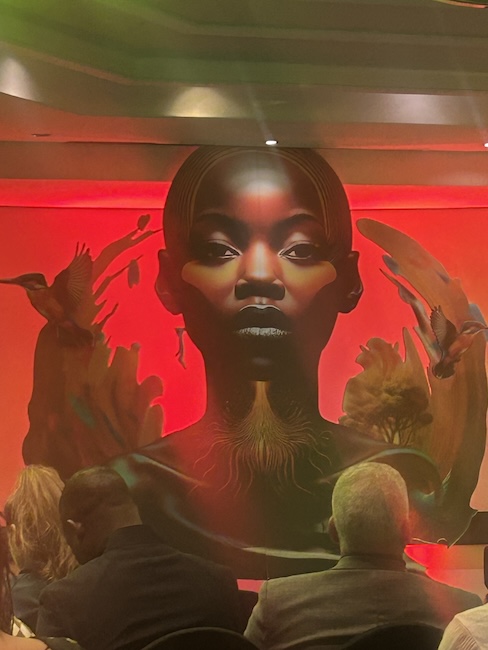Nigerian Osahon Akpata – a Cairo-based development investor – has a mission to propel the creative economy in Africa into the stratosphere.
A creative himself, the self-styled African business evangelist published a detective novel for kids at the age of 11, and more recently directed an acclaimed project by multimedia artist Iké Udé called Nollywood Portraits: A Radical Beauty, which had an extended run at the Smithsonian.
Akpata joined development bank African Export-Import Bank (Afreximbank) in April last year to establish Canex Creations Inc, a subsidiary of its equity investment, Fund for Export Development in Africa (Feda), via its five-year-old cultural arm, the Creative Africa Nexus Programme (Canex).
After holding its first board meeting last month, Canex Creations Inc is now operational, with a mandate to make strategic equity investments in intellectual property (IP) across the creative and cultural sector, and to unlock IP’s inherent monetary value.
In a parallel Herculean move to “revolutionise Global Africa’s film and creative industry”, Afreximbank has announced plans to launch a $1bn Africa Film Fund, which is set to be operational by the end of the year.
Interviewed on the sidelines of the Durban FilmMart 2025, Akpata echoed a conversation theme at the lively film market: that Africa is “on the cusp of cracking it” in film – globally and on the continent – despite challenges that include limited production facilities, equipment, exhibition infrastructure and access to digital platforms.
“In the global space, people are gravitating to international independent films; there is a growing appetite,” he says, pointing to Best Picture Oscar winners Anora this year and Parasite in 2020. “People are growing tired of seeing remakes and franchises. There is interest in creativity, with people saying: ‘Please, show us something else.’ And in Africa, we have rich stories that have not been told. But we need talent and development to shape and deliver our stories.”

Growing Africa’s economy
This is where Canex Creations Inc comes in, and why Akpata was in back-to-back closed-door pitch meetings with creatives during the four-day Durban FilmMart, which attracted 1,364 delegates from 63 countries over July 18-21.
The bank is committed to revolutionising the creative industry by ensuring Africans own their IP, instead of external entities claiming ownership.
The bank notes the film industry’s potential, and also that something needs to be done. “There is an understanding that if we figure out how to fund the film industry, with distribution and monetisation, we will grow our economy in Africa.”
Akpata says people often think of mineral resources such as oil and gas when they think of Africa, but these are not everlasting resources. Yet Africa, with a population of 1.5-billion, has a large base of young, talented people in the broad creative space, more than in any other sector. And unlike minerals, IP can generate long-lasting revenue without the risk of depletion.
The film and audiovisual industry alone generates an estimated $5bn of GDP and employs more than 5-million people across the continent, according to Unesco.
And projections indicate that by 2050, Africans will make up a quarter of the world’s population – up from just 8% in 1950. In what has been called the “youthquake” phenomenon, at least one-third of all young people aged 15 to 24 will be African.
“This is why it is imperative to monetise, professionalise and formalise the creative industry, to give it structure to flourish, for the benefit of future generations,” says Akpata, who holds an MBA from Columbia Business School, and spent almost eight years at Ecobank Transnational Inc before joining Afreximbank, which has been operational since 1994 with a mission to transform trade on the continent.

Sustainability for shareholders
Akpata is at pains to stress that, unlike “soft” finance, which often sustains independent filmmaking and creative projects, the company expects returns. “We are a development finance institution, but we do need a return to keep it sustainable for our shareholders, who are African countries, central banks and private investors. We are certainly not trying to lose their money. An investor who puts money in is looking at getting money out, not having a project sit on the shelf.”
When it comes to films, equity funding via Canex Creations Inc would typically be about $500,000-$5m. The company would then recoup the principal plus 20% premium, and continue to earn a portion of net proceeds.
Akpata would not be drawn into providing updates about the upcoming $1bn film fund, as it is a Feda prerogative and not within his immediate mandate, beyond stating that it is due to be operational by the end of the year. He notes that the funds would go beyond content and extend across the value chain.
Akpata’s childhood experience as a storyteller and adult side hustle working with Nollywood entrepreneurs and museum exhibitions have helped crystallise his career and passion. “Being a creative, but having a business background, has helped to balance things out, enabling me to be interested in the business success of creatives,” he says.
“It is not easy to be a creative anywhere in the world, let alone in Africa, where it is typical to say: don’t go there, do the safe thing. If we can build more structure around the creative economy, and allow people to access markets and funding – all the better for creators, and the economy.
“What drives me most is to get results, and for creatives to get financial success from their intellectual property.”
Top image: Osahon Akpata. Picture: Janet Heard; Rawpixel/Currency collage.
Sign up to Currency’s weekly newsletters to receive your own bulletin of weekday news and weekend treats. Register here.













If an African creative has a fully developed idea, he should apply for and create a patent portfolio that is made up of 3 to 4 standalone and independent “modules” – each one of which protects his idea and invention. That way if one patent e.g. module 2, takes a hit, then the other 3 that are granted can sustain ownership of the invention.